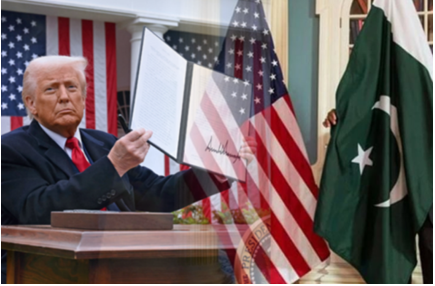INP-WealthPk
Muhammad Saleem
Although the recent US tariffs on Pakistani exports present significant challenges, textile exporters believe they also offer an opportunity to strengthen Pakistan’s trade position, promote value-added production, and deepen economic ties with the United States.

Talking to WealthPK, Pakistan Textile Exporters Association (PTEA) Secretary Azizullah Goheer said after a careful review of the evolving situation, exporters believe that the imposition of additional tariffs does not appear to be definitive. The disruption seems strategic and temporary by design, primarily aimed at bringing the affected countries to the negotiating table.
He said the world is witnessing a collective response, and many countries have already initiated formal engagement. It is also evident that the broader global reaction to these US actions, particularly concerning the services provided by American companies worldwide – remains a critical factor.
The implications of these tariffs are not limited to trade alone; they are expected to trigger a multidirectional impact on the global economy, the full extent of which is yet to unfold, he added. Currently, Pakistan’s textile exporters face an immediate challenge due to the shipment deferrals by US buyers, as they evaluate the evolving situation.
A few of our large exporters are selling on Landed Duty Paid (LDP) terms, and they will face a substantial financial hit with the imposition of an additional tariff on Pakistani goods. “This immediate challenge poses a significant threat to their cash flows. We recommend that the State Bank of Pakistan step forward with a temporary working capital facility to support exporters whose orders have been deferred by US buyers and who are now stuck with the unsold inventory.
This measure will help them stay afloat until the situation finds a logical solution, the PTEA secretary added. He said the textile product supplies to the US from Pakistan, China, Vietnam, Cambodia, Bangladesh, and other countries involve significant volumes, which cannot be replaced overnight. China, in particular, has major capacities in raw materials, especially synthetic-rich materials.
India has a 4% competitive advantage over Pakistan, and its additional tariffs of 26% could negatively impact Pakistan’s home textiles and apparel exports unless a swift agreement is reached with the US. Goheer said textiles are Pakistan’s major export to the US, and the country is also one of the largest importers of US cotton.
Given the domestic shortfall in cotton production, he noted that importing cotton from the US presents a strategic opportunity for Pakistan, unlike other major textile-exporting countries that have abundant local cotton. Pakistan needs to align its sourcing strategies and minimize the overall impact of tariffs, he added.
He said the tariff increase raises concerns about pricing pressures, reduced orders, and shifts in buyer preferences. However, Pakistan remains better positioned than competitors such as China, Vietnam, Bangladesh, and Cambodia due to comparatively lower additional tariffs.
Former central chairman of the Pakistan Hosiery Manufacturers and Exporters Association (PHMA) Haji Salamat Ali, told WealthPK that despite higher duties, Pakistan still retains a competitive edge over other major textile-exporting countries. He said Pakistan’s tariff rates are low compared to those of Vietnam and Bangladesh, and even one percent diversion of their orders to Pakistan could significantly boost the country’s exports.
“New orders will generate jobs and strengthen our economy. However, our factories may not be able to handle a sudden influx of new orders. Pakistan’s integrated supply chain, adherence to quality standards, and well-established trade relationships with American buyers could help the country navigate the current situation.”
Talking to WealthPK, President Faisalabad Chamber of Commerce and Industry Rehan Naseem said the current situation could present an opportunity for Pakistan to overcome the current economic crisis. He appreciated that Prime Minister Shahbaz Sharif had called for an urgent meeting on the issue. He suggested that the government act swiftly and begin negotiations with the US regarding the tariff issue.
He mentioned that a delegation is expected to visit US soon. He warned that a sluggish response to this issue could put us in a difficult position, potentially leading to a deficit of 1 to 2 billion US dollars. Rehan also highlighted that this was a favorable time for China to export to the US through Pakistan, as the tariffs on Chinese products are higher than those on Pakistani goods.
Credit: INP-WealthPk





